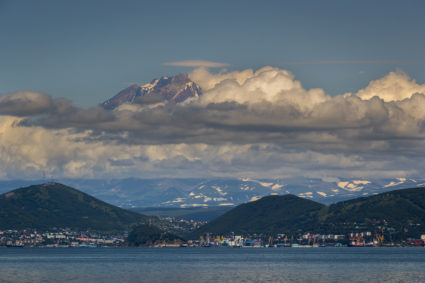
At the beginning of the Cold War in 1949, Jackie Robinson appeared before the House Un-American Activities Committee to disavow…

Our April 2020 pick for the PBS NewsHour-New York Times book club is Julia Phillips' "Disappearing Earth." Become a member of the Now Read This book club by joining our Facebook group, or by signing up to our newsletter. Learn more about the book club here.
Even before sisters Alyona and Sophia Golosovsky go missing in the novel "Disappearing Earth," it's not hard to pick up on the fact they are in danger. Author Julia Phillips wanted to convey this "sense of fear and instability," so she opens with a story about the 1952 Kamchatka tsunami caused by a magnitude 9.0 earthquake off the coast of a Russian peninsula.
Alyona's exaggerated recounting of the tsunami is a way of entertaining her little sister Sophia, but as Phillips noted to the PBS NewsHour, it also inspired the title of the story: "The whole book rests on this story one sister tells another about a town that vanished, swept away by a giant wave," Phillips wrote. "That's our chunk of disappearing earth."
Phillips spent a year in Kamchatka doing research before she wrote the book, steeping herself in the region's culture and history. This is apparent in various details throughout the book — from her descriptions of prefab Soviet-era apartment buildings to traditional Russian cottages, called "izbas." Read more about those observations in her annotations below.
"I'm bored," said Sophia.
Alyona lay back. The rock was hard on her shoulders, cold on her head. "Come here," she said, and Sophia stepped out of the bay, picked her way over, and squirmed next to Alyona. The smallest stones crunched together. The breeze had left Sophia's body as cool as the ground. "Want me to tell you a story?" Alyona asked.
"Yes."
Alyona checked her phone. They had to be home in time for dinner, but it wasn't even four o'clock. "Do you know about the town that washed away?"
"No." For someone who never obeyed, Sophia could be very attentive. Her chin lifted and her mouth pinched shut in concentration.
Alyona pointed down the shore at the most distant cliffs. To the girls' right was the city center, from where they had walked this afternoon; to the left, marking the mouth of the bay, were those black hulks. "It used to be there."
"In Zavoyko?"
"Past Zavoyko." They sat under the peak of St. Nicholas Hill. If they had kept walking along the shoreline today, they would have seen the stony side of the hill eventually lower, exposing the stacked squares of a neighborhood overhead. Five-story Soviet apartment buildings covered in patchwork concrete. The wooden frames of collapsed houses. A mirrored high-rise, pink and yellow, with a banner advertising business space for rent. Zavoyko was kilometers past all that, making it the last district of their city, Petropavlovsk-Kamchatsky, the last bit of land before sea. "It was at the edge of the cliff where the ocean meets the bay."
"Was it a big town?"
"It was like a settlement. Like a village. Just fifty wooden houses, filled with soldiers, wives, and babies. This was years ago. After the Great Patriotic War."
Sophia thought about it. "Was there a school?"
"Yes. A market, a pharmacy. Everything. A post office." Alyona pictured it: stacked logs, carved window frames, doors painted turquoise. "It looked like a fairy tale. And there was a flagpole in the middle of town, and a square where people parked their old-fashioned cars."
"Okay," Sophia said.
"Okay. So one morning, the townspeople are making their breakfasts, feeding their cats, getting dressed for work, and the cliff starts to shake. It's an earthquake. They've never felt such a strong one before. Walls are swaying, cups are smashing, furniture is–"
Here Alyona looked to the gravel beside her but there was no washed-up branch for her to snap–
"Furniture is breaking. The babies are crying in their cribs and their mothers can't reach them. They can't even stand up. It's the biggest earthquake the peninsula has ever had."
"Their houses fall on them?" Sophia guessed.
Alyona shook her head. The rock she leaned against pressed into her skull. "Just listen. After five minutes, the quake stops. It feels like forever to them. The babies keep crying but the people are so happy. They crawl toward each other to hug. Maybe some sidewalks split, some wires snapped, but they made it–they lived. They're lying there holding each other and then, through the holes where their windows used to be, they see this shadow."
Sustain our coverage of culture, arts and literature.